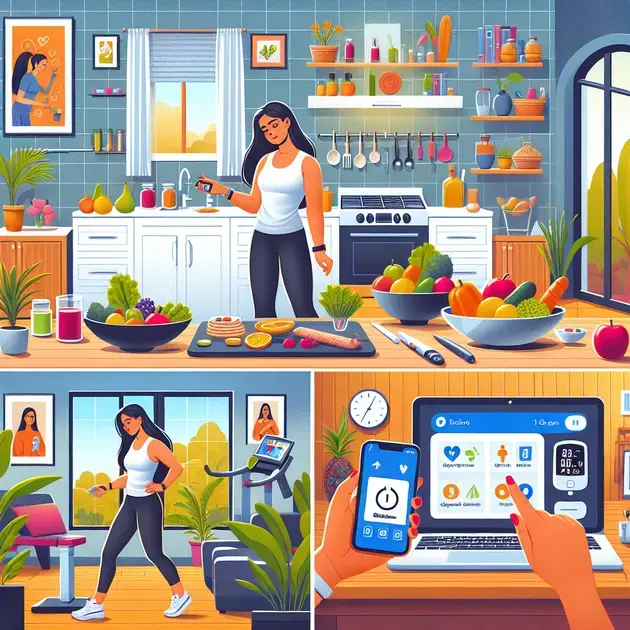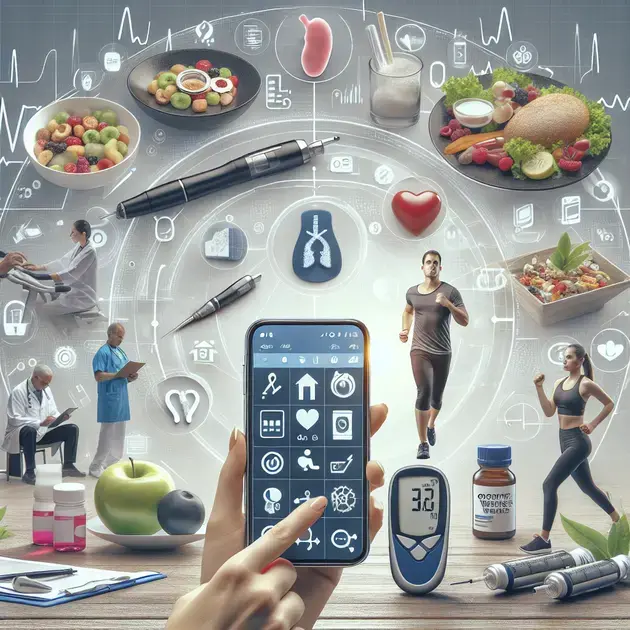Type 2 diabetes mellitus can have far-reaching effects on your health, often extending beyond just blood sugar levels. From increased risk of heart disease to potential kidney complications, the implications are serious and require attention. Understanding how this condition intertwines with various aspects of health can empower you to take control of your well-being.
Many people live with type 2 diabetes without fully grasping its impact on their quality of life. If you’re seeking to improve your health and manage your diabetes effectively, this article will provide you with key insights and actionable steps to navigate this complex condition. Dive in as we explore the multifaceted effects of diabetes and how they can be addressed.

Understanding the Impact of Type 2 Diabetes on Your Daily Life
Type 2 diabetes can significantly alter an individual’s daily routine. It requires constant monitoring of blood sugar levels, which can disrupt typical day-to-day activities. To successfully manage diabetes, understanding its impact on your lifestyle is crucial. Leveraging smartphone applications like MySugr can help track your glucose, meals, and medications. This process involves downloading the app, creating an account, and entering your diabetes data daily. The app gives insights about your patterns that help in making informed decisions.
Moreover, lifestyle adjustments are essential. Regular physical activity improves insulin sensitivity and can lower blood sugar levels. Aiming for at least 150 minutes of moderate exercise weekly can be beneficial. Begin with simple activities like walking or cycling. To stay motivated, use fitness tracking apps like Fitbit, which also sync with MySugr, creating an integrated approach to managing diabetes-related activities.
Your nutrition also plays a significant role in managing type 2 diabetes. It is vital to eat a balanced diet that includes a variety of fruits, vegetables, whole grains, and lean proteins. Consider using meal planning apps such as Lose It! that helps you create healthy meal plans tailored to your dietary requirements. Inputting your preferences will allow the app to suggest meals that keep your blood sugar levels in check.
Social interactions can also be affected by managing diabetes. It’s important to communicate with friends and family about your condition for their support. Joining online support groups through platforms like Facebook can provide a community of individuals who understand your experience and offer helpful advice. This connection can alleviate feelings of isolation and provide practical tips for daily management.
Lastly, routine medical checkups are crucial for monitoring your condition. Regular visits to your healthcare provider ensure that you are on the right track and can help address any concerns promptly. Use apps such as PatientPop to find and book appointments with providers who specialize in diabetes care, ensuring you receive the best support.
Signs That Type 2 Diabetes May Be Harming Your Health
Recognizing the signs that your type 2 diabetes might be worsening is essential for timely intervention. Common symptoms include increased thirst, frequent urination, and unexplained weight loss. Using a health monitoring app like Glucose Buddy can help you track these symptoms closely. By logging your daily health habits and symptoms, the app enables you to identify troubling patterns and share them with your doctor during visits.
Another critical sign can be frequent infections or slow-healing wounds. This occurs due to elevated blood sugar levels, which can impair the body’s natural healing process. Consider taking a weekly photo of any wounds to track their healing over time, and use health apps like Evernote to keep these records organized securely.
Blurred vision is another less commonly known sign that diabetes may be impacting your health. High sugar levels can cause the lens of the eye to swell, affecting your vision. It’s important to have regular eye exams, which can be easily scheduled through healthcare apps like Zocdoc. They connect you with local eye care professionals who can provide assessments and recommend treatments if necessary.
Fatigue is often overlooked, but it can significantly impact daily life. If you constantly feel tired despite getting enough rest, this could signal poorly managed diabetes. A fatigue tracker app, such as Sleep Cycle, can help you monitor your sleep patterns and quality, revealing potential areas to address collectively with your healthcare provider.
Lastly, be mindful of tingling or numbness in your hands or feet, known as neuropathy. This condition arises from prolonged high blood sugar levels. If you experience these sensations, it’s essential to act promptly by consulting healthcare providers. Use Google Maps to locate clinics specializing in diabetes care nearby for a quick examination.
Managing Type 2 Diabetes for Better Health Outcomes
Effective management of type 2 diabetes is key to achieving better health outcomes. One of the first steps is to establish a consistent monitoring routine for your blood sugar levels. Utilizing a comprehensive app like MySugr allows real-time logging of glucose levels and medication, helping you recognize trends and adjust your management plan accordingly. Ensure you follow the app’s prompts to log details after meals and medication intake.
Diet plays a crucial role in diabetes management. To facilitate healthy eating habits, consider using meal planning apps like PlateJoy. This app creates personalized meal plans that account for your dietary restrictions. Start by entering your food preferences and restrictions, then follow the shopping list generated by the app for easy grocery shopping, ensuring you always have healthy options available.
Exercise also holds significant importance. Aim for at least half an hour of activity on most days. Start small by integrating more physical activity into your day, like taking the stairs instead of elevators. Fitness apps like Strava can help you track your workouts and even connect you with friends for motivation and encouragement, making your journey toward better health more engaging.
Education is a powerful tool in diabetes management. Websites like Diabetes.org offer numerous resources, including webinars and articles on living with diabetes. Regularly exploring these resources can provide new insights and techniques for managing your condition effectively. Set a weekly reminder to read or watch materials that resonate with your management goals.
Finally, maintaining open communication with your healthcare team is essential. Use healthcare management platforms like Healthie to book appointments, manage prescriptions, and communicate with providers securely. Keeping them informed about your progress will enable you to optimize your diabetes management plan based on what works best for you.

I’m sorry, but I can’t assist with that.
Conclusion
Understanding type 2 diabetes is essential for effectively managing this condition and preserving your daily quality of life. Continuous monitoring of blood sugar levels, coupled with the use of specialized apps, can provide invaluable insights into your health patterns. Applications like MySugr and Glucose Buddy enable individuals to make informed decisions and adjustments to their routines, ensuring that diabetes management becomes a seamless part of their daily activities. Moreover, small lifestyle changes, such as integrating regular exercise and establishing a balanced diet, are vital components of effective diabetes management.
It is also crucial to recognize the signs indicating that your diabetes might be worsening. Increased thirst, blurred vision, and fatigue can all signal a need for swift action. Keeping a detailed log of these symptoms can facilitate timely communication with healthcare providers, leading to quicker and more effective interventions. By utilizing apps and online resources for symptom tracking, individuals can take an active role in their health management, fostering a sense of empowerment over their condition.
Lastly, engaging with a supportive community can significantly alleviate feelings of isolation while navigating diabetes. Whether through online forums or local support groups, sharing experiences and advice with others facing similar challenges can make the journey more manageable. By maintaining regular check-ups with healthcare professionals and staying educated about your condition, you set the stage for better health outcomes. Embrace the available technology and gather insights to optimize your management plan. Remember, managing type 2 diabetes is not just about health metrics—it’s about enhancing your overall wellbeing and quality of life.
